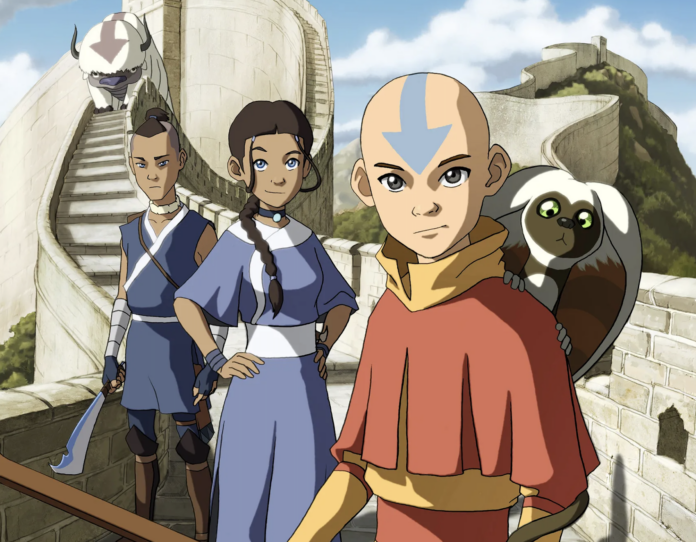Here’s how one of Nickelodeon’s most successful shows has stayed beloved and critically acclaimed in the public eye
By NATALIE SALTER — arts@theaggie.org
On Feb. 21, 2005, children’s television channel Nickelodeon aired the pilot episode of what would become one of their most critically acclaimed shows and prompt multiple live-action adaptations, a string of comic books and an entire animated sequel to continue the universe.
“Avatar: The Last Airbender” captivated audiences upon its initial release and still receives immense praise and recognition nearly 20 years later.
It became apparent that “Avatar” was something more than children’s entertainment: it had a universe rich in fascinating characters and moving story arcs that continue to hold up in the eye of critical analysis decades later.
The series is set in a universe where certain individuals are born with the ability to manipulate and wield an element: fire, water, earth and air. The show’s titular character is Aang, an airbender who is also the newest reincarnation of the Avatar, a powerful entity capable of wielding all four elements who is reborn into a new body after the previous incarnation dies.
After being frozen in ice for a century, Aang discovers that he is the last surviving airbender, with his people being wiped out in a devastating genocide carried out by the war-mongering Fire Nation in their campaign to imperialize the other kingdoms. The Avatar’s responsibility is to promote and maintain peace between the nations, and thus Aang is left to shoulder the responsibility of stopping the Fire Nation’s 100-year conquest and unite the four elements once more.
This barely touches the surface of the show’s complex and fascinating worldbuilding and storytelling, which deftly deals with themes of imperialism, genocide, environmentalism, parental abuse and the costs of war in ways that are understandable to both young and experienced audiences. Despite the terrible conflicts that Aang and his friends witness and become caught in, the story repeatedly shows audiences that there is love and hope to be found in even the darkest of times. The love each character wields throughout the series reveals that their love is a stronger power against the hatred of war than any weapon or bending power.
Furthermore, the story is applicable to one’s real-life experiences. Part of the show’s rewatchability lies in the fact that when you feel lost or scared of what the world is becoming, “Avatar” can remind you that you always have the ability to change your life by choosing to do good despite the odds stacked against you.
The characters of “Avatar” are equally complex, crafted with strong personalities, nuanced motivations and emotions that resonate with viewers no matter how many times they have seen the show. For example, the dynamic between Sokka and Katara, siblings from the Southern Water Tribe, extends beyond brother-sister banter. Sokka’s stubborn desire to lead and toxic ideals of masculinity combined with Katara’s overly motherly tendencies and high maturity for a girl in her early teens are not just traits placed onto the characters to elicit comedic arguments: they are indicators of the deeper natures of each character.
The loss of their mother and separation from their father are explored thoughtfully as nuanced experiences that affect their personalities and decisions. Furthermore, the siblings’ arcs give them realistic places to grow and mature. This extends out to the other members of the cast of characters too.
For example, the exiled prince of the Fire Nation, Zuko, has received massive critical acclaim for his arc of self-discovery, progressing from villain to hero whilst liberating himself from the pain and abuse of his past. “Avatar” devotes itself to not only having well-written characters, but developing them in emotionally moving ways that encourage the audience to look inward and find ways to heal and grow in order to make the world a better place.
Of course, as a show geared toward younger audiences, “Avatar” has plenty of lighthearted material to enjoy. The show’s playful sense of humor, endearing character dynamics, themes of found family and adorable animal sidekicks make it as much a comfort show as an excellent piece of storytelling. It’s easy to fall in love with the show’s beautiful scenery and relaxing music, and it often feels like a warm hug to curl up and watch the heroes joke around and explore the world together.
“Avatar” brilliantly balances phenomenal writing and character development with the warmth and peacefulness of any true comfort series. If you want to feel at ease, study fascinating characters or see stunning worldbuilding matched with engaging storytelling, “Avatar” is there for you — and 19 years later, it delivers in every category just as perfectly as ever.
Written by: Natalie Salter—arts@theaggie.org






